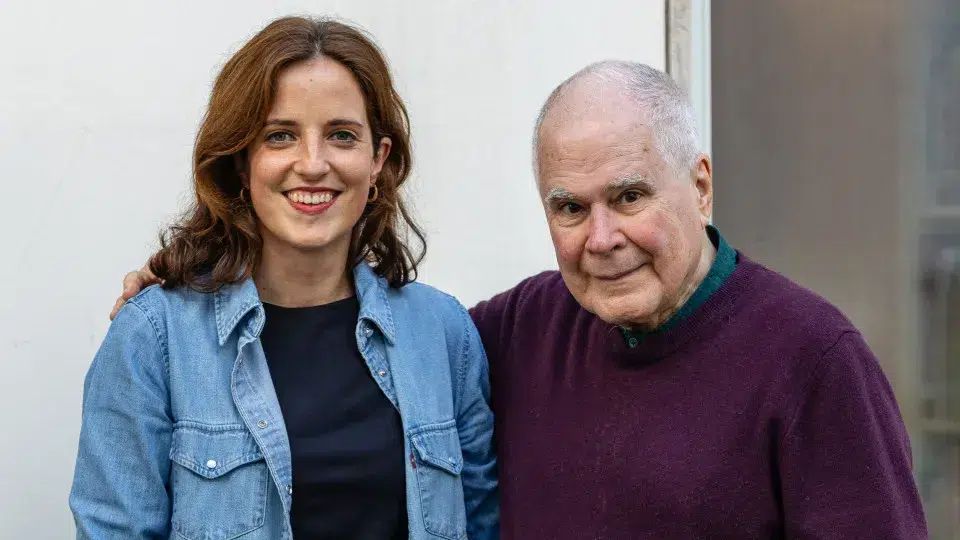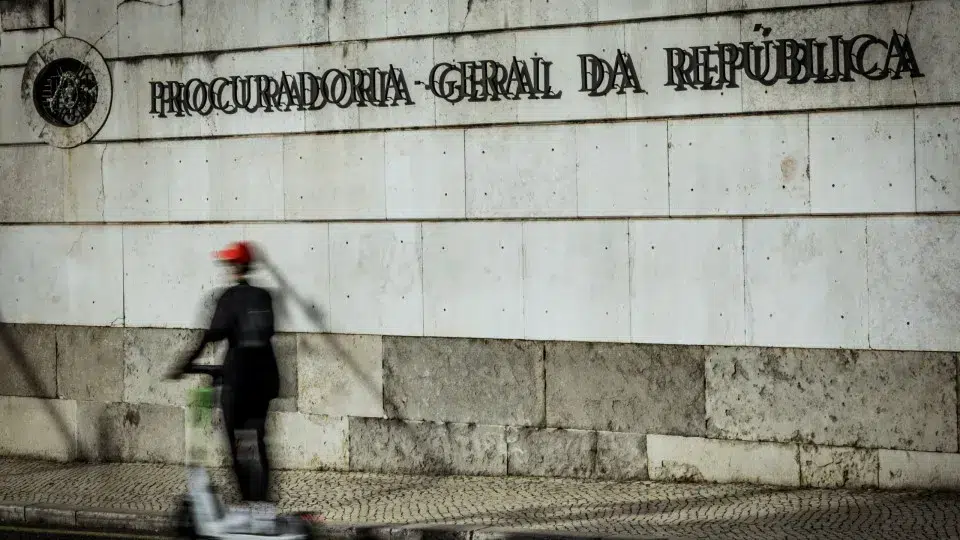
‘A Última Lição de José Gil’ is the latest book by journalist and writer Marta Pais Oliveira. This time, the author offers readers a distinctly different ‘journey’. She presents a form of biography of José Gil, one of Portugal’s greatest philosophers and thinkers.
In a kind of extensive interview, conducted weekly over six months, Marta and José Gil discussed the Past, Present, and Future, Space, Time, Desire, and Mozambique, France, and Portugal.
The ‘lessons’ drawn from this deep conversation are numerous but far from being the last that José Gil has to offer. As the writer noted, this is a collection by Contraponto that “alludes to the retirement class of a university professor, providing space for the ideas of great Portuguese thinkers whom we recognize as teachers, in the fullest and strongest sense of the word”.
José Gil, aged 86, “continues to write and publish, and his texts remain very much alive”.
I admire his texts. He is an extraordinary philosopher from whom we have much to learn
‘A Última Lição de José Gil’ is a kind of extensive interview with the thinker and professor José Gil. How did this idea come about? It’s a book entirely different from those you had accustomed us to…
It is the first non-fiction book I publish. The idea arose from a deviation. I had spoken with editor Rui Couceiro about the possibility of writing a biography of a poet, and I started a doctorate to study the work of the person I was going to biograph. At a certain point, I realized the path was not there. I interrupted the doctorate and proposed to Rui to write ‘A Última Lição’. In that first year of interdisciplinary studies where I crossed literature, architecture, and dance, I was reading many texts by José Gil on the body in space. I had already read the phenomenon ‘Portugal Today: The Fear of Existing,’ and I was eager to read more of him. I admire his texts. He is an extraordinary philosopher from whom we have much to learn, and I was very happy when he promptly agreed to converse for such long hours and share reflections on his life and work. My background is in journalism, and I am enthusiastic about conversing with those who prompt us to think better. It was fortunate that the route changed to open this meeting that transformed me and that I am certain will transform readers.
Why did you decide to divide the book into three segments (Space, Time, and Desire)?
After the first hours of conversation—the interview was maintained over six months, between October 2024 and March 2025, with weekly meetings—I sketched the index that would guide the reader. How do the spaces we traverse build our identity? What are these times we navigate today? Space and Time are like invisible frames of our action or modes of organizing human experience. They are the two great conditions or orders of magnitude to which we are subject. Poetry, music, any form of art frees us from that which subjugates us, shattering limits. Therein lies the potency of Desire, that displacement force that originates from the body, a vital force. It’s that desire that moves us and prompts our creativity. The creative power exists in each of us. This triadic organization crosses the biography with José Gil’s major lines of thought.
Beyond being a lesson, this book is also a journey. The first section traces three spatialities: Mozambique, France, and Portugal. Why?
It’s a journey full of vigor and vivacity, filled with surprises and passions. Revitalizing. With that very singular vivacity that José Gil possesses, which I would say is part of his uniqueness, that continuous enthusiasm. The first chapter is very biographical and stems from the geographies that profoundly shaped José Gil: Mozambique, where he was born, in a settlement in the Niassa wilderness; Paris, where he studied and experienced the May ’68 revolution; Corsica with its call for independence; and Portugal, where he settled after April 25th and encountered an atmosphere of silencing that persists to this day, with echoes of the Salazar era, with a corroded public space. We start with Space, which is a constant concern in José Gil’s work. Once those roots are planted—or, as we will discover, fractured, as he does not see himself as a returnee or alienated—we will understand how he developed his philosophical thought. He was nurtured by movement. The reader has access to very unique episodes: José Gil was almost captured by a cult, drove ambulances in a psychiatric clinic, at one point got tired of what he heard at the Sorbonne and sold his library, wrote fiction and plays before seeing his mother tongue implode, attended Deleuze’s courses, and fell back in love with philosophy.
As revealed on your social media, the second section focuses on temporalities surrounding democracy and populism, digital and ecology, meditating on fear, death, and freedom. How are these themes interconnected?
It seemed very important to interpret today’s times. We live in very unsettling times of threats and regressions, with dignity eroded. During my conversations with José Gil, Trump returned to power, promised to build in Gaza the Riviera of the Middle East; in Portugal—as well as in Europe—the far-right continued to grow, we witnessed extreme environmental events, such as the floods in Valencia or the fires in Los Angeles.
José Gil outlines three major crises: the rise of the far-right, the unregulated use of Artificial Intelligence in favor of death rather than life, and the climate scourge. What does the possibility of species extinction mean?
He warns us that democracy, in our country, remains an ideal yet to be fulfilled, highlighting Portugal as an unequal, corrupt, and violent society—consider the domestic violence against women—pointing out our lack of a value scale to assess what is important and what is not. He notes the power distanced from popular culture, a denial of our roots. And that perpetual fear that prevents us from asserting who we are, fear that is the greatest obstacle to freedom. José Gil dedicates his life to studying the infra-verbal, to what words fail to capture. Also, to the zones of transition between the individual and the collective. We enter the uncodifiable, the body as an instrument of power, offering us clues to think better. It’s also a very honest book about aging, about death, and how it can intensify life.
And how does Desire arise? What themes do you address at this point?
Psychoanalysis (Freud, Lacan) suggests that desire originates from a lack, a deficiency, never satisfied. Yet, a philosophical perspective (here José Gil continues Deleuze’s thinking, his great influence) reveals desire as a creative force, a flow that invents realities. It is on this Desire that we will meditate, starting with three bodies that escape codifications and live immanence against oppressive drives: primitives, children, and artists. In common, they have the capacity to transform. José Gil speaks of a capacity to become, to be many. In this book, he shows us possibilities of freer and more dignified lives, reflects on the power of language, shares his passion for literature, especially Fernando Pessoa, painting, and dance. These are spaces of oxygen in the interview. I think the book presents deep ideas without obscure or arid language; it is a very pleasurable read. Several readers have shared this magical feeling of going very deep through José Gil’s reflections, maintaining a surprising lightness. Only a great teacher has this gift.
One of the reflections in ‘Última Lição’ is about the country’s colonial past…
Yes, José Gil reflects on the colonial violence in Quelimane and Lourenço Marques, where he grew up. And it shows the perverse dual repression—taking the land from the black community, denying them everything, stealing their lives, imposing a religion on them. As a colonist’s son, he shares the experience of living artificially, learning songs in school about the Portuguese fields and rivers, having no words to describe the vast African expanse surrounding him, being taught a sense of superiority from a young age to which he never succumbed. And the colonial echoes spread, as the trauma was silenced for a long time.
Without memory, no future. Remembering is, also, a form of fighting
Although the book’s title is ‘A Última Lição de José Gil,’ this is not his last lesson, as he continues with his thoughts and even ‘sketching’ future books. So, why ‘last’ lesson?
The title is from Contraponto’s collection that alludes to the retirement class of a university professor, providing space for the ideas of great Portuguese thinkers whom we recognize as teachers, in the fullest and strongest sense of the word. The warning is given right at the start of the book: this is not the last lesson, José Gil continues to write and publish, and his texts remain very much alive. I would very much like this book to lead more readers to his vibrant work.
Given what we are experiencing today—the rise of the far-right, genocides, wars—what importance do books like this have, which not only discuss the future but also reflect on the present and the past?
I tried to make the book as broad as possible. To think about today’s concerns, we need to analyze important milestones in our history that brought us here. Without memory, no future. Remembering is, also, a form of fighting. After so many achievements, we cannot afford poor memory and accept the spreading of barbarism. Advancing without restraint and without ethics is also a form of inertia. José Gil starts from everyday behaviors: what happens in our common perception of things, in interpersonal relationships? From there to the larger scale. It is a philosophy concerning our life, what dignifies us or not, what liberates or oppresses us. I believe in the importance of this testimony from someone who is wise and free, who has traversed very diverse periods, always maintaining his acute lucidity.
José Gil tells us clearly: totalitarianisms cannot bear affection. And he points out three forms of resistance: love, humor, and art.
Why do you advocate that “thinking beyond fear, illusions, oppression, and manipulations is still one of the strongest gestures of resistance”?
Exactly because we live in these times of absurd manipulation. What is the point of rushing if we are running in the wrong direction, trampling everything and everyone, killing ourselves in that uncontrolled pace? It is also necessary to reclaim words as commitments to honesty, not instruments of distortion. What we call reality is shaped by the very language. There were conversations where we talked a lot about threats, what could annihilate us. I reflected on the possibilities we are giving to those who are children today and those not yet born. On the way back to Porto, I saw orange streaks in the sky, it was dusk, a certain serenity and charm. The total dissonance. Something like: the car is going in the wrong direction, it’s going to crash, and we didn’t manage to defend beauty. Thinking is the gesture that can restore an idea of humanity and a habitable planet.
Indeed, this book truly urges the reader to think and reflect. What is the main lesson you want to convey to your readers?
A potent book is an action trigger. What can philosophy do in times of diseased acceleration? Each reader will find angles that illuminate them with greater intensity. Reading José Gil is resisting distraction and lack of depth. Our attention is precious, we must use it well. What we do today is opening or closing possible futures; that responsibility requires us to pay a lot of attention, to be curious about others. The other that is ourselves, the ability to become others is one of the greatest forces we can have. José Gil tells us in this book, with his clarity and strength, that a conversation is the permanent opening of difference. It would be nice to relearn the art of conversation against fear, hate, and the raising of walls. He shows us how philosophy connects to our daily lives. It is not an abstraction; it is a bond with life, a perspective on what liberates or oppresses us. Philosophy asks questions to transform problems, extracting from chaos concepts and ways of seeing. It is an exercise of wonder, curiosity, unease. To combat the fear that corrodes everything and create new configurations, this book points us to an ethic of affection. José Gil tells us with clarity: totalitarianisms cannot bear affection. And he points out three forms of resistance: love, humor, and art. We can be better, we must be better. And that awareness is what drives us forward.




